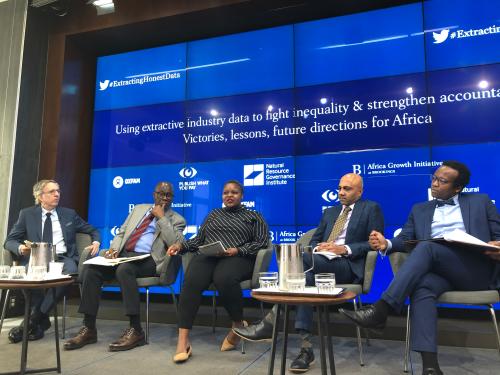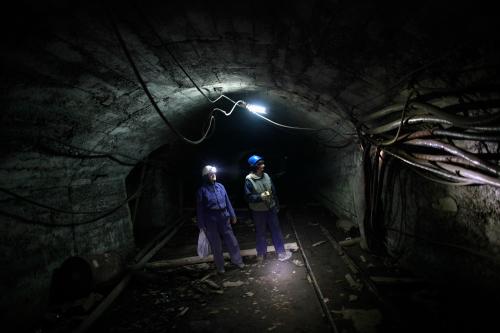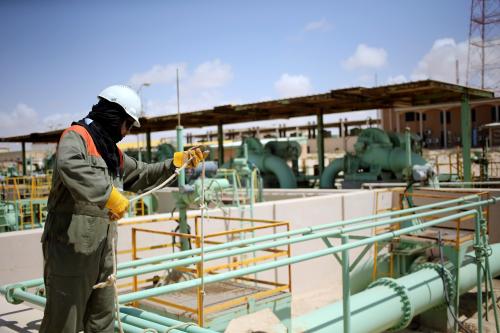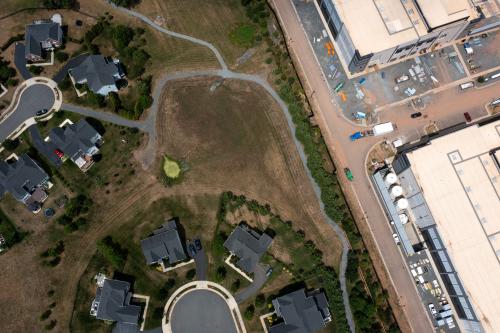Expansion of transparency in the extractive industries, which began in the 1990s and has become mainstreamed in the decades since, has yielded tremendous results. $2.63 trillion in revenues has been disclosed by 54 countries through the Extractive Industries Transparency Initiative (EITI), 77 datasets in open data format are maintained by the Natural Resource Governance Institute, and contracts between governments and extractive companies have been published in more than 40 countries—to name just a few examples.
However, there is much further to go. Disclosure of information such as contracts between governments and companies, the amount of taxes paid to governments by companies, the social impacts of resource extraction, and much more are not yet universal. Where they are disclosed, they are often far from comprehensive. To advance transparency and accountability in the sector, further work is needed to make extractives data widely available and usable.
For extractives data to have an impact, it should exist in an easily accessible and usable open data format that can be adopted by so-called “infomediaries”—civil society organizations and journalists. That allows infomediaries to translate this technical information for the public. Members of the public can then, if they have the ability, capacity, and the will, turn information into action.
This (admittedly oversimplified) path from open data to meaningful accountability is far from linear, but we know it can work: The open data movement has enabled the effective use of extractives data by civil society organizations, journalists, governments, and the public in many countries around the world.
Here, we examine illustrative examples of extractives data use along the natural resource value chain in three countries, and highlight the lessons that can be learned by all those seeking to turn disclosures into impact.
Indonesia
Indonesia’s extractive sector has experienced explosive growth since the 1980s, with the production of coal alone rising more than a thousand–fold in three decades. As mineral and coal extraction boomed in the 2000s and early 2010s, however, regulations faltered and failed to keep up with the pace of development. Provincial leaders handed out thousands of mining licenses to large and small operators alike, often without due diligence and verification, and sometimes in exchange for cash or political favors. As the mining boom slowed in the mid-2010s, environmental degradation became evident, and as the developmental benefits of mining remained irregular at best, Indonesia began to reassess its extractive policies.
Extractives data has proven to be an asset for Indonesia in crafting stronger, more efficient, and more equitable policies governing its extractive sector. The civil society organization Publish What You Pay (PWYP) cross-referenced data on mining licenses with spatial data to assess whether licensees were operating where they were supposed to be, finding that over 200,000 hectares were likely home to unlicensed mining operations. (The original report is available in Indonesian on Publish What You Pay’s website here.) These findings then helped convince Indonesia’s Corruption Eradication Commission (KPK) to improve the governance of Indonesian mining.
All told, Indonesia has used extractive licensing data in conjunction with economic and on-the-ground analysis to report some 6,000 suspicious or fraudulent (not “clean and clear”) mining licenses, of 11,000 total mining licenses granted during the boom period.
In another instance, PWYP-Indonesia used mining project payment data to assess whether the governments of two resource-rich districts had used their resource wealth to enhance local development. Finding that development had not been fully realized, PWYP recommended changes in revenue allocation, with special attention paid to the provision of public services and to poverty alleviation.
Not only can such reports reduce the impact of corruption and bribery, but they can also provide civil society organizations, communities, and local governments recourse for reclaiming natural resource revenues to promote equitable development at the local level.
Currently, Publish What You Pay and other civil society organizations in Indonesia are encouraging the implementation of a map policy to avoid overlap on licensees’ spatial maps, and a data policy (integrated in open data format) to allow for more effective oversight and ensure the benefits of resource extraction for Indonesia’s citizens.
Ghana
Ghana’s history of resource extraction stretches back to the early days of colonization, when it was called, in turn, the Portuguese Gold Coast, the Dutch Gold Coast, and the British Gold Coast. Today, it is Africa’s largest producer of gold. In the past decade, the country has also become a producer of oil and gas, after decades of exploration led to the discovery of the Jubilee oil field in 2007; production began in 2010, and oil revenue now surpasses mining revenue in the country. Ghana was an early EITI adopter, becoming a candidate country in 2007, and was designated in compliance with the disclosure requirements of the EITI Standard in 2010.
Ghana’s status as an EITI-implementing country, coupled with its oil boom and robust civil society engagement on extractive issues, has led to notable achievements in the use of extractives data to promote better governance.
Ghana’s early EITI reports revealed that the country was receiving little in the way of taxes from the mining sector, from just $27 million in 2004 to $91 million in 2008. These numbers were caused by generous taxation terms given to mining companies allowing for companies to pay a sliding scale of gross revenues between 3% and 12%; however, the disclosures revealed that the rate rarely if ever went above the minimum 3%, and royalty and tax contributions did not increase along with commodity prices.
As a result of these disclosures, Ghanaian civil society—an active presence in the extractive sector—advocated for higher taxation of mining companies and for increased spending of mining revenues on social development programs. The subsequent 2010 amendment to the Mining Act raised the royalty rate to 5% and abolished the sliding scale. Between 2010 and 2011, the Ghanaian government’s mining revenues more than doubled, in large part due to these and other changes in the mining law.
Ghanaian civil society’s use of extractives data to spur policy change did not end there. As oil production increased in the country, so did concerns over revenue management in that sector; commercial development of the Jubilee oil field had been fast-tracked, and Ghana began production with no revenue management legal framework or independent regulation in place. However, thanks in large part to recommendations from civil society representatives, the Petroleum Revenue Management Act of 2011 advanced greater transparency in the oil sector.
In the oil sector, disclosure requirements, and EITI reports in particular, also proved of use in resource revenue management: The country’s 2011-2012 report found that there was no capital gains tax charged to one of the oil companies operating in the Jubilee field, though such transactions were taxable by law. The fiscal regime was subsequently changed to ensure that capital gains would be taxed in the future.
These successes, though notable, have not been a panacea: Ghana has nonetheless struggled to translate its resource wealth into broad-based economic development, and the pandemic has exacerbated this situation. As the country navigates an uncertain future and overlapping crises, transparent and timely disclosures in the natural resource sector will be more important than ever to gain a clear-eyed view of Ghana’s economic development.
Colombia
Two recent initiatives in Colombia seek to analyze and enhance the use of extractives data. These initiatives are tracking the use of royalties at the subnational level and strengthening the use of data by indigenous communities affected by mining projects, including data related to consultation processes.
Royalty payments can play a significant role in bolstering local development: Between 2012 and 2019, royalties provided US$17.7 billion for public investment in Colombia’s water and sanitation, housing, infrastructure, education, and more. Access to accurate, user-friendly data on royalties in the extractive industries is therefore important for understanding the extent of available funds and how those funds are being used.
In 2019, the Transparency and Accountability Initiative (TAI), Global Integrity, and the International Finance Corporation identified a set of challenges regarding the availability and use of royalties data in Colombia. For example, while data on royalties is available via multiple platforms in Colombia, the complexity of the royalties system, compounded by decentralized and non-interoperable platforms, makes it challenging to access and analyze the available data on royalty payments and corresponding development projects.
Gaps in data availability—including due to the large proportion of small-scale and informal mining—limit civil society organizations’ and governments’ abilities to assess the full picture of the mining sector and related royalties. The threat of corruption and role of armed groups in illegal mining also hamper effective data disclosure and use.
Based on the findings from this assessment, Transparencia por Colombia and the Akubadaura Lawyers Commission launched initiatives in 2019 to test approaches for strengthening extractives data use for increased transparency and accountability. While aspects of both initiatives have been delayed by COVID-19, progress is ongoing.
Transparencia por Colombia aims to better understand the linkages between royalties and development projects in Colombia by analyzing how royalties are allocated to projects by national and subnational authorities. The organization is working with partners in a civil society group for transparency in the extractives sector to improve transparency and accountability in the reform of the General System of Royalties. In addition, the organization will be working with 10 local partners across the country to track the use of royalties for development projects and in response to the COVID-19 emergency.
The Akubadaura Lawyers Commission, led by indigenous women, is analyzing the impact of royalty resources on indigenous communities and tracking consultation commitments for extractives projects. As noted by TAI, “prior consultation of indigenous groups affected by natural resource extraction is a fundamental right” but one that is “often disregarded in practice.” The Commission also seeks to use extractives data to support indigenous leaders in better advocating for legislative measures surrounding extractive projects that affect their communities.
Additional information on these efforts is expected from TAI and Global Integrity later this year.
Conclusion
The examples above illustrate many of the technical, bureaucratic, and political challenges that transparency, accountability, and natural resource governance champions face in their efforts to advance access to and use of extractives data. However, these efforts also demonstrate that progress toward transparency and accountability is possible across the natural resource value chain—including consultation, licensing, revenue collection and taxation, and expenditure—when civil society and government champions alike work to improve quality, accessibility, and use of extractives data to benefit communities.
The authors thank Maryati Abdullah and Jorge Florez for providing helpful inputs on the work of Publish What You Pay Indonesia and on behalf of Global Integrity, respectively. Thanks also to Catherine Conrow for fact-checking this piece.
The Brookings Institution is committed to quality, independence, and impact.
We are supported by a diverse array of funders. In line with our values and policies, each Brookings publication represents the sole views of its author(s).







Commentary
Using extractive industries data for better governance
October 6, 2020